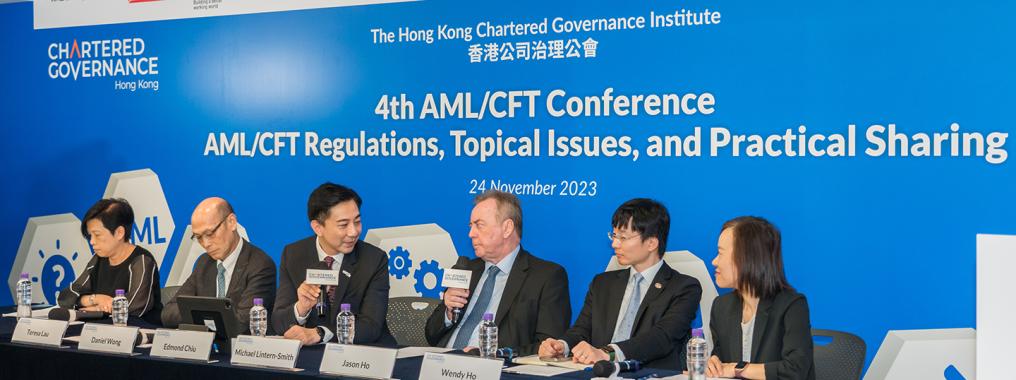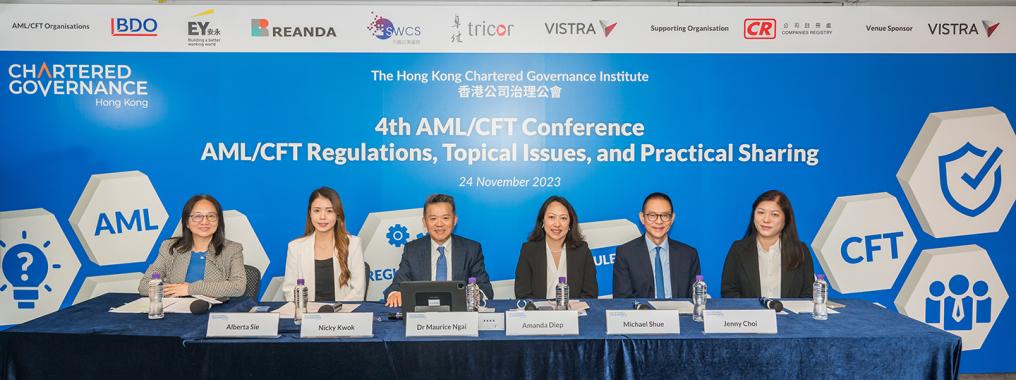This month’s interview in the NextGen Governance column, featuring younger members of the profession, is with Rain Lam ACG HKACG, Senior Officer, Secretarial of Legal and Risk Management Department, Orient Overseas (International) Ltd.
What is your current role and what was your career path to this role?
‘I studied finance at City University of Hong Kong. By sheer coincidence, I joined a company secretarial team as an intern in a professional services firm. This year I joined Orient Overseas (International) Ltd, a listed company whose principal activities are in container transport and logistics services. Our department includes both corporate and listing teams. My main task is to assist the listing team with annual compliance requirements, such as preparing for the annual general meeting, interim reports and board meetings. I have discovered that there are many more things involved in this profession – and that it is more important – than I had previously imagined. Corporate governance is similar to the role of airport customs. Each decision can be considered as a piece of luggage in which the governance professional acts as the baggage scanner. If there is anything inappropriate from a governance perspective, or does not comply with regulations, we will intercept that baggage and examine how to handle the situation, ensuring proper control.’
When did you first hear the terms ‘company secretary’ and ‘governance’? What was your impression of these terms?
‘I first heard about the role of a company secretary from my father. He knows my personality well and thought that I would be suited to the position because it follows a systematic and orderly approach. He had seen news reports mentioning that this career has good prospects. When I was choosing my university major, I also considered enrolling in related courses but in the end I didn’t pursue it. As for corporate governance, I used to think it was something only top-level executives would be involved in.’
What qualities do you think are needed to be a successful governance professional?
‘The field of corporate governance is very complex as it involves various types of business relationships and constantly evolving rules. With each new update there are new challenges. First, it is important to have an open mind when it comes to learning new things. For example, many documents are now transitioning to a paperless format and the formalities of work have changed. If you don’t keep up with learning, you will quickly fall behind. Second, attention to detail is crucial because the industry itself does not tolerate errors. One must be diligent in ensuring everything is accurate.’
What was your chosen route to complete the Institute’s qualifying programme and what advice would you give to people who are considering qualifying as a Chartered Secretary and Chartered Governance Professional?
‘I chose the Chartered Governance Qualifying Programme examinations for two main reasons, the first being flexibility in terms of time and the second being the higher cost effectiveness compared with taking a master’s degree. Besides, there are also many resources available from the Institute that can assist us in preparing for the exams, making the learning process much more effective. Furthermore, I believe that to be an outstanding company secretary you should have a well-rounded education, which requires additional expertise beyond that of pure corporate governance. If I undertake further studies, I would therefore choose related disciplines.’
As a member of the younger generation, how do you think governance will evolve in the future and would you recommend a career in governance to others?
‘I believe that the future will undoubtedly be characterised by digitisation and even AI integration. In the corporate secretarial field, hybrid meetings, online voting and paperless operations have already become the norm. It is possible that in the future AI could integrate real-time data to expedite the process of risk management and decision-making. However, this industry will not disappear as there are certain insights that AI cannot provide. We will contribute to the company’s decisions by offering perspectives that are both objective and subjective.’
it is possible that in the future AI could integrate real-time data to expedite the process of risk management and decision-making
Rain Lam ACG HKACG
Senior Officer, Secretarial of Legal and Risk Management Department, Orient Overseas (International) Ltd
新一代治理这个栏目主要采访行业中的年轻成员。本月新一代治理的主角是林芊希女士ACG HKACG,东方海外(国际)有限公司法律及风险管理部高级主任。
请问您目前的职位是什么?能告诉我们您的职业发展经历吗?
‘我在香港城市大学修读财务,实习的时候机缘巧合地加入了专业服务公司的公司秘书团队。今年我转职到一家上市公司,东方海外(国际)有限公司,主要从事货柜运输和物流业务。我任职的部门有企业组和上市组,我主要是在上市组帮忙处理每年的合规工作,例如准备周年股东大会、中期报告,和安排董事会会议。我发现这个专业接触到的事情和范畴比我想象中多很多,这专业的重要性也比我想象中大。公司治理的角色很像机场海关,如果每一个决策是一件行李,公司治理就像是行李扫瞄器。从治理的角度来看,如果有任何事情不适当,或者不符合规则,我们就会截停那个行李,再去看看怎样处理事情,做好把关的工作。’
您第一次听到 ‘公司秘书’或 ‘公司治理’是什么时候?您当时对这些专业名词有什么印象?
‘我是从我爸爸那里第一次听到公司秘书这个专业名词。他了解我的性格,知道我适合按部就班和条理的工作,所以他认为我适合从事公司秘书这个专业。他也看过新闻报导,说这个专业前景很好。大学选科系时,我也曾考虑报读相关课程,但最后没有成事。至于公司治理,我最初以为是公司高层才会接触到的东西。’
您认为成为一名成功的治理专业人士需要具备哪些素质?
‘公司治理这个范畴很复杂,牵涉很多不同类型的商业关系及时常更新的规则,每当有新的更新,就会带来新的挑战。第一,对于学习新事物要持有开放的态度,比方说很多文件最近已转为无纸化,工作的程序也随之改变,如果你不持续学习,很快就会跟不上步伐。第二是要注重细节,因为这个行业不可以有错误,要用心确保所有事情是准确的。’
您完成公会的资格计划的路径是怎样的?对于那些有想去成为特许秘书和公司治理师的人,您有什么建议?
‘我选择参加特许公司治理专业资格课程考试,主要有两个原因,第一是时间上的灵活性,第二是成本效益比修读硕士课程高。而且公会也有很多资源可以帮助我们准备考试,令学习过程更加有效。我觉得出色的公司秘书一定要接受全面的教育,需要具备公司治理以外的专长。所以如果我将来再进修,我会选择相关的科目。’
作为年轻一代的一员,您认为 ‘治理’将来会如何发展?您会推荐其他人从事治理方面的工作吗?
‘我觉得未来无疑会数码化甚至人工智能化。在公司秘书行业,混合模式会议、网络投票、无纸化运作已经成为常态,以后人工智能也许可以整合实时的资料,加速风险管理和决策过程。不过,公司秘书专业不会消失,因为有些独特见解是人工智能无法提供的,我们会从客观和主观的角度提供意见,让公司管理层做决定时作为参考。’
以后人工智能也许可以整合实时的资料,加速风险管理和决策过程
林芊希女士ACG HKACG
东方海外(国际)有限公司法律及风险管理部高级主任



